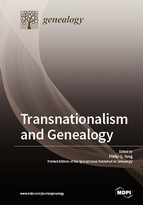Transnationalism and Genealogy
A special issue of Genealogy (ISSN 2313-5778).
Deadline for manuscript submissions: closed (31 January 2019) | Viewed by 32063
Special Issue Editor
Interests: international migration/immigration; race and ethnicity; Asian Americans; transnationalism; citizenship; population studies; quantitative methodology
Special Issues, Collections and Topics in MDPI journals
Special Issue Information
Dear Colleagues,
This Special Issue of Genealogy invites essays on the topic of “Transnationalism and Genealogy.” Transnationalism is classically defined by anthropologists Basch, Glick Schiller, and Blanc-Szanton (1994, p. 7) as “the processes by which immigrants forge and sustain multi-stranded social relations that link together their societies of origin and settlement.” The goal of this issue is to examine the relationship between transnationalism and genealogy. The impact of transnationalism on family relations, family history, and family lineage across the globe is at the center of this issue. The editorial team hopes to attract contributions from a wide spectrum of disciplines or sub-disciplines with different theoretical perspectives and various methodological orientations that can broaden and strengthen the scope and depth of genealogical studies. We are particularly interested in articles that address the following issues, although all pertinent submissions are welcome:
- The impact of immigrant transnationalism on family relations
- The role of immigrant transnationalism in writing or rewriting family histories
- The effect of immigrant transnationalism on family lineage
- The role of transnational marriage in transnational family dynamics
- Cross-border intra-ethnic, interethnic, and interracial marriages and bloodline
- The role of transnational adoption in transnational family relations
- Transnational adoption and lineage
- Prevalence of transitional families
- Transnational family arrangements including, but not limited to, transnational parents leaving their children behind, “parachute kids,” and “astronaut” families
- Transnational motherhood, fatherhood, and childhood, and their differences from traditional motherhood, fatherhood, and childhood
- Transnational childrearing arrangements
- Effects of migration policies on transnational families
- Contexts in the countries of origin and destination and decisions on transnational family separation or reunification
- Transnational migration and familial naming practices
- New horizons or insights brought by transnationalism to the field of genealogy
Prof. Dr. Philip Q. Yang
Guest Editor
Manuscript Submission Information
Manuscripts should be submitted online at www.mdpi.com by registering and logging in to this website. Once you are registered, click here to go to the submission form. Manuscripts can be submitted until the deadline. All submissions that pass pre-check are peer-reviewed. Accepted papers will be published continuously in the journal (as soon as accepted) and will be listed together on the special issue website. Research articles, review articles as well as short communications are invited. For planned papers, a title and short abstract (about 100 words) can be sent to the Editorial Office for announcement on this website.
Submitted manuscripts should not have been published previously, nor be under consideration for publication elsewhere (except conference proceedings papers). All manuscripts are thoroughly refereed through a double-blind peer-review process. A guide for authors and other relevant information for submission of manuscripts is available on the Instructions for Authors page. Genealogy is an international peer-reviewed open access quarterly journal published by MDPI.
Please visit the Instructions for Authors page before submitting a manuscript. The Article Processing Charge (APC) for publication in this open access journal is 1400 CHF (Swiss Francs). Submitted papers should be well formatted and use good English. Authors may use MDPI's English editing service prior to publication or during author revisions.
Keywords
- transnationalism
- genealogy
- family relations
- family history
- family lineage
- transnational marriage
- transitional families
- transnational adoption
- transnational migration






